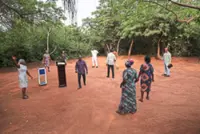IF you fancy hiking sticks that are natural wood, visit the Orang Asli on either side of the Sungai Perak rest area along the North-South Expressway.
The north and south-bound rest areas are hard beside Sungai Perak and on both rest areas, off to a corner, are booths run by Orang Asli of the Temiar tribe offering a number of products found in the jungles near Kuala Kangsar, Perak.
Already a subscriber? Log in
Get 20% OFF The Star Digital Access
Cancel anytime. Ad-free. Unlimited access with perks.





